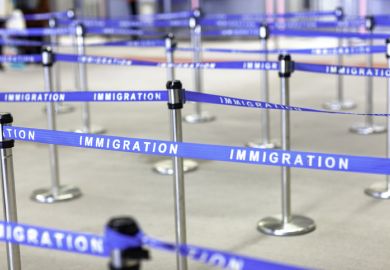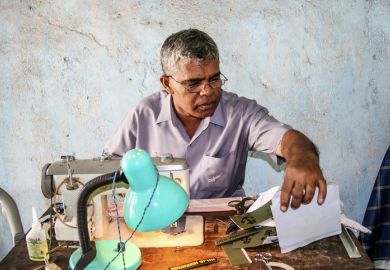Prospective students from China are “growing impatient” with Australia’s closed borders, and more than half the 100,000-odd Chinese stranded at home with Australian visas are now ready to switch to countries where they can study face-to-face, it has been warned.
Beijing-based diplomats have warned of a widespread perception that Australia was “closed for business”. Chinese agents report that just one-quarter of their clients are open to studying there – with safety a “big concern” following warnings from China’s Ministry of Education (MOE).
Competitors Canada and the UK have kept their borders open, leveraging the reputational advantage they gained by embracing international students in their pandemic wage subsidy schemes. “We hear a common critique from agents about the perceived level of [Australian] government appreciation of students,” said Andrew Carter, Australia’s trade commissioner for education.
“Sentiment is not trending in Australia’s favour,” he told a webinar organised by the federal education department as part of consultations over a new international education strategy.
The appraisal is not good news for an international education sector facing a potential wipe-out because of Australia’s stalled vaccine programme. Canberra has abandoned its target of inoculating the domestic population by October over supply issues and rare side-effects from the AstraZeneca vaccine.
Commentators fear that this could defer the return of international students until mid-2022, with policymakers unwilling to open the borders while infection flare-ups remain a risk.
Brooke Hartigan, minister-counsellor for education and research at Australia’s embassy in Beijing, cited reasons for optimism about student flows. She said that China faced an “enormous capacity problem” in educating its burgeoning middle class, with just 5 per cent of last year’s 11 million gao kao college entrance examinees able to secure places in the country’s top 100 universities.
Australia also enjoyed a “solid reputation” for delivering transnational education in China. “We have over 250 joint programmes and over 10 joint institutes…and some of these have been in place for more than two decades,” she said.
“But we also have a perception sometimes that we are in it for the money – that we are not invested as much as China would like.”
Ms Hartigan said that joint programmes could expect more “evaluation and oversight” after the MOE signalled dissatisfaction with them earlier this year. “The ministry is quite concerned about condensed teaching time frames and teachers flying in and flying out. They would like universities…to be providing their top teachers for a longer period.”
She said that Australia appealed to Chinese students because of its relative proximity, compatible time zones, appealing lifestyle and “track record” of positive student outcomes. Mr Carter said that Australia’s pluses included its rankings performance and a “perception of accessibility” due to its flexible pathways.
“We assume that we will still have a large Chinese international student cohort…over the next 10 years and that Australia’s value proposition remains attractive. But there are a lot of variables that make predictions difficult – competitor activity, how and when we can welcome students back, how well we continue to deal with Covid, and whether we can continue to up our game in terms of offering a quality student experience.”
He said that Chinese sentiment had shifted away from Western credentials, as “sea turtles” returning with overseas qualifications saw little reward in their pay packets. “We’re seeing evidence that they may actually be at a disadvantage [compared] to students from domestic institutions.”
Register to continue
Why register?
- Registration is free and only takes a moment
- Once registered, you can read 3 articles a month
- Sign up for our newsletter
Subscribe
Or subscribe for unlimited access to:
- Unlimited access to news, views, insights & reviews
- Digital editions
- Digital access to THE’s university and college rankings analysis
Already registered or a current subscriber? Login








